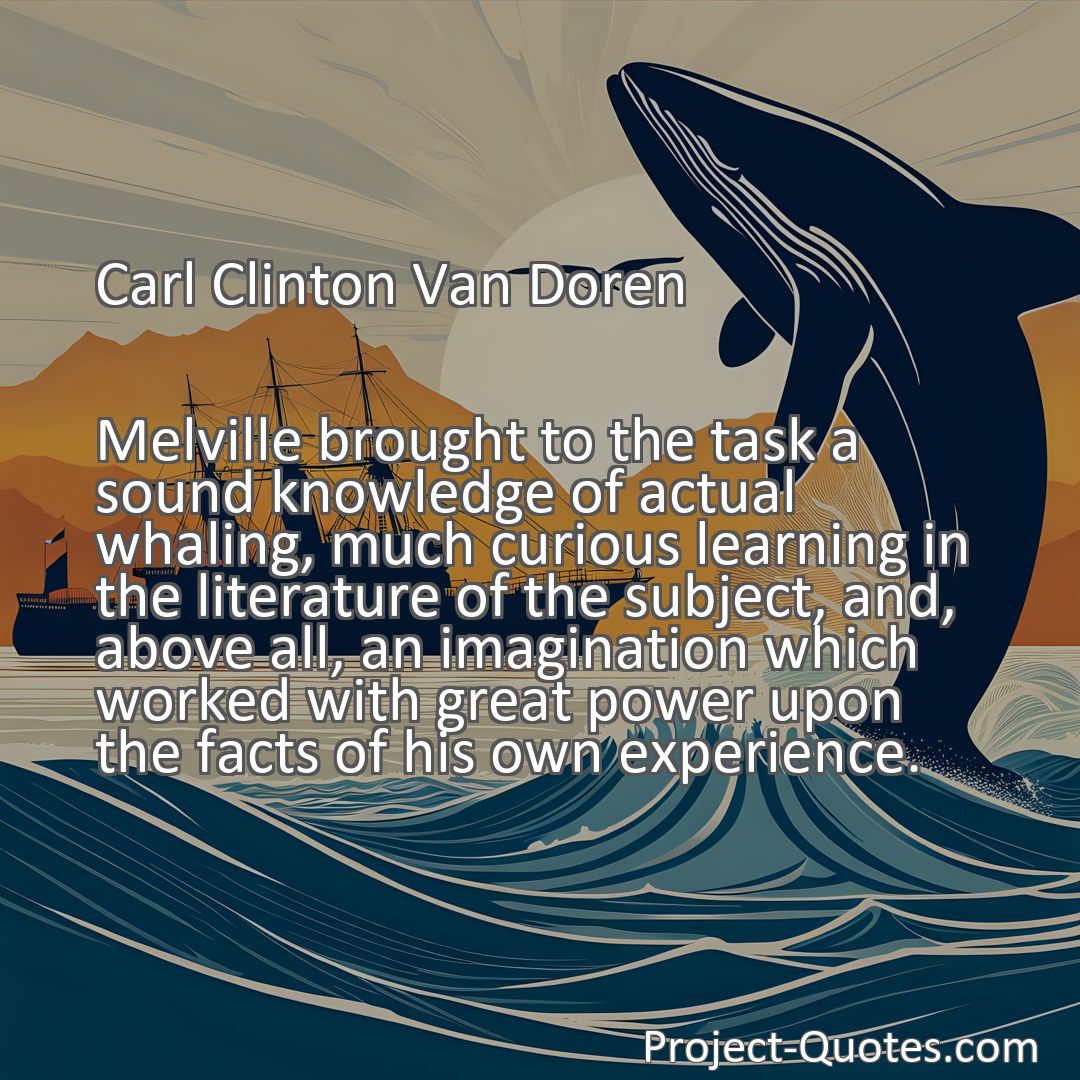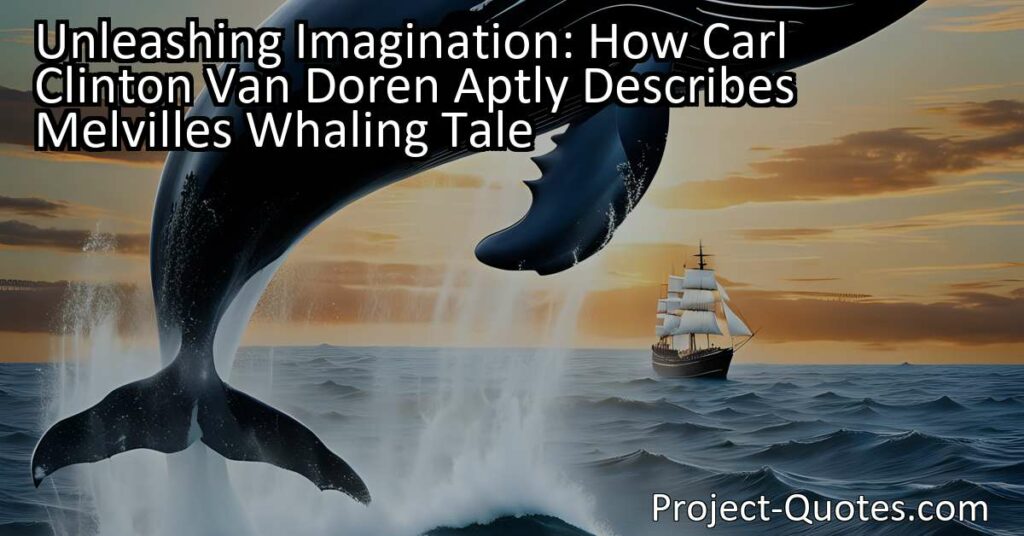Melville brought to the task a sound knowledge of actual whaling, much curious learning in the literature of the subject, and, above all, an imagination which worked with great power upon the facts of his own experience.
Carl Clinton Van Doren
Carl Clinton Van Doren aptly describes how Herman Melville’s imagination brings his whaling tale to life in Moby-Dick. Melville’s extensive knowledge of whaling, combined with his profound imagination, creates a captivating narrative that blurs the lines between fact and fiction. Through his storytelling, Melville invites readers to explore their own imaginations and discover the extraordinary within the ordinary.
Table of Contents
- 1 Melville brought to the task a sound knowledge of actual whaling, much curious learning in the literature of the subject, and, above all, an imagination which worked with great power upon the facts of his own experience.
- 2 Carl Clinton Van Doren
- 3 Meaning of Quote – Melville brought to the task a sound knowledge of actual whaling, much curious learning in the literature of the subject, and, above all, an imagination which worked with great power upon the facts of his own experience.
- 4 Freely Shareable Quote Image
- 5 Related
Meaning of Quote – Melville brought to the task a sound knowledge of actual whaling, much curious learning in the literature of the subject, and, above all, an imagination which worked with great power upon the facts of his own experience.
Unleashing Imagination: The Whaling Tale of Herman Melville
Introduction :
In his timeless masterpiece, Moby-Dick, Herman Melville takes readers on a thrilling journey through the world of whaling. Carl Clinton Van Doren aptly describes Melville’s unique approach to this task, highlighting his extensive knowledge of whaling, fascination with its literature, and the profound influence of his personal experiences. Spanning the realms of fact and fiction, Melville’s boundless imagination propels readers into a vividly immersive narrative, where the boundaries between reality and the fantastical blur. This article further explores the enigma of Melville’s imagination and its impact on his illustrious work.
Whaling as a Backdrop: Knowledge Meets Reality :
Melville’s exceptional grasp of whaling’s intricacies began with his personal experiences at sea. In his youth, Melville undertook countless adventures as a seaman, working aboard several whaling vessels. This unique exposure endowed him with a firsthand understanding of the realities of life aboard a whaling ship, the dangers faced on the high seas, and the complex dynamics between the crew members. Such genuine encounters with the whaling industry allowed Melville to create an authentic backdrop for his novel.
Furthermore, Melville showcased his deep love for the whaling tradition by extensively studying the literature on the subject. His in-depth knowledge of whaling practices, historical accounts, and mythologies surrounding the noble beast permeates the pages of Moby-Dick. Calling upon this wealth of information, Melville weaves a captivating tale that immerses readers in the sights, sounds, and emotions of the whaling world.
Imagination: A Transformative Force :
As Carl Clinton Van Doren points out, Melville possessed an imagination of extraordinary power. Combining his factual understanding of whaling with a sprinkle of creative genius, Melville transformed mundane details into enchanting storylines. The vivid descriptions of harpooning, the technicalities of whale anatomy, and the intricate rituals of the whaling industry come alive through Melville’s imaginative prowess.
When reading Moby-Dick, one can almost feel the spray of ocean mist on their face and hear the thundering song of the majestic Sperm Whale. Melville’s imaginative touch ignites the reader’s senses, making the story tangible and unforgettable. Even more impressive is the manner in which Melville intertwines the mystical elements of whaling folklore with the harsh realities of the industry, merging imagination and reality seamlessly.
The Whale as a Symbol: Myth and Meaning :
Central to Melville’s narrative is the enigmatic white whale, Moby-Dick. The author’s imagination takes flight as he imbues this symbol with far-reaching mythical significance. Moby-Dick represents the pursuit of the unattainable, an embodiment of nature’s vastness and power, and an elusive force that haunts and consumes those who seek to conquer it. By layering these complex interpretations onto the physicality of the whale, Melville elevates the story’s themes to encompass universal human desires and struggles.
Through his imaginative storytelling, Melville leaves room for readers to interpret Moby-Dick’s deeper meaning. Some may see the whale as a symbol of the destructive effects of obsession, while others may view it as a representation of an untameable aspect of the human spirit. This multidimensionality is a testament to the potency of Melville’s imagination, fostering discussions and interpretations that transcend the confines of the novel.
Conclusion :
Herman Melville’s Moby-Dick remains an indelible work of literature and a testament to the power of imagination. As Carl Clinton Van Doren astutely notes, Melville’s extensive knowledge of whaling, coupled with his profound imagination, produced a masterpiece that continues to captivate readers of all ages. Through his ability to transform facts into fantasy and weave reality with myth, Melville invites us all to explore the boundaries of our own imaginations and discover the extraordinary within the seemingly ordinary.
I hope this quote inspired image brings you hope and peace. Share it with someone who needs it today!


